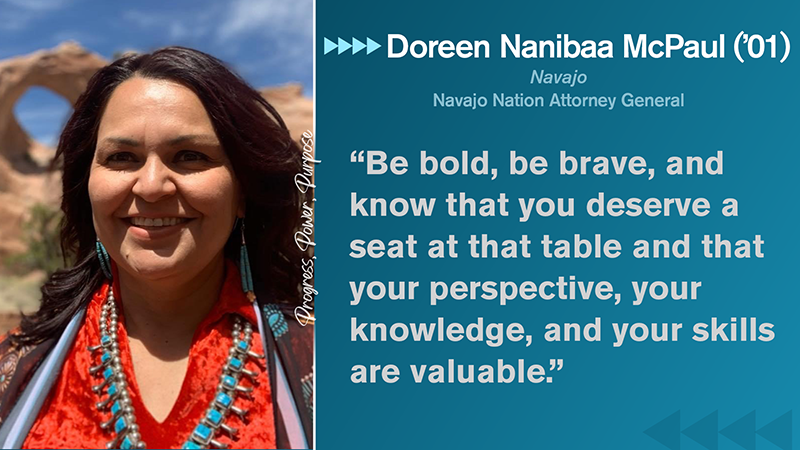Women's History Month
In celebrating “Women’s History Month,” we turned to some of the women of the ILP to shed light on Native women legal professionals and advocates in this Progress, Power, Purpose series. Native women have been making history since the beginning of time and this Navajo woman of the Kinyaa’aanii clan has armed herself with extensive legal and government knowledge: clerked at the Arizona Court of Appeals, worked as a staff attorney for the Navajo Nation Judicial Branch, former associate attorney at the Nordhaus Law Firm, served as a visiting clinical law professor and Interim Director of ASU Law’s Indian Legal Clinic and now, back to working with her people on the Navajo Nation.
Q: What does your current position entail?
A: I am the Navajo Nation Attorney General. In that capacity, I serve as the Nation’s Chief Legal Officer and oversee the Nation’s Department of Justice, including the Office of the Prosecutor and the Navajo Hopi Legal Services Program. The Department of Justice is charged with providing legal representation to the Navajo Nation government, including the 3 Branches of government, the various Executive Branch Departments and Divisions, and the 110 local governing Chapters.
Q: Were you always interested in this kind of work?
A: I knew I wanted to practice Indian law and work with tribal entities. I’ve now worked as an attorney for tribal governments for 13 years and also I have chaired a national organization committed to the work of tribal government attorneys for 8 years.
Q: What advice do you have for Native American women who want to work in this area?
A: Working as an in-house attorney is challenging and rewarding. I actually left my law firm job when I was expecting my first child because I was convinced that I couldn’t be a good mom and a good billable law firm lawyer. I thought I had to choose. I also didn’t have any role models at the time to know that there are some seriously amazing women who are doing both! The blessing in disguise though is that I discovered my passion working as a tribal government attorney.
Q: What is your proudest career moment?
A: Being appointed as Attorney General for my own tribe.
Q: Is there anything you’ve learned after graduating law school that you wished you learned in class?
A: I wish I’d taken a clinical course. So much of what we do requires practical knowledge and skills. I did take Professor Robert Clinton’s tribal government class and got to draft a juvenile code with Judge Flies Away for a tribe in Minnesota. It was a profoundly rewarding and practical experience.
Q: What is the most valuable lesson you learned in the classroom that has helped you in your career?
A: Professor Rebecca Tsosie encouraged me to try out for law review and to apply for a judicial clerkship – opportunities that I didn’t know existed and that I would not have sought without her encouragement. I did try out for law review and served as a staff writer my 3L year, and I also applied for a clerkship and was selected for one with the Arizona Court of Appeals for post-law school. It made my 3L year and studying for the bar easier knowing I had a job lined up.
Q: Who are three Native American women law professionals and/or advocates who should be on our radar right now?
A: There are so many amazing Native women legal professionals doing amazing work across Indian country who we all know and love. One who should be on everyone’s radar is Paulene Abeyta. She is a 3L at the University of Arizona and currently serves as the President of National NALSA. She is Navajo, she is a military spouse, she is a mom, and she’s an incredible human being. Amber Holland is another to have on the radar. She is Lumbee, a UNM law grad, and just finished a gig at NCAI and will join the Big Fire law firm. Paulene and Amber are going to be wonderful advocates for Indian Country. Last but not least is Lydia Locklear. I serve on a Judicial Clerkship Committee with Lydia and she is impressive! She is Lumbee, a Michigan State law grad, and serves as Deputy Tribal Attorney for the Catawba Nation.
Q: In your career, did you ever feel like the lone Native American voice in the room? How did you overcome those adversities? For that girl/woman who is finding her rhythm and trying to carve out a space to thrive, what advice would you give her?
A: I’ve been the only woman in the room and I’ve also been the only Native American at the table. I’ve also been introduced as the Navajo Nation Attorney General alongside a male colleague, and the person I was introduced to extended a “nice to meet you Mr. Attorney General” to my colleague.
My advice is to be bold, be brave, and know that you deserve a seat at that table and that your perspective, your knowledge, and your skills are valuable. Also, find and surround yourself with support systems of other women who you can rely on for honesty and perspective.
Q: Favorite law school memory.
A: Hanging out in the ILP student break room upstairs at the old law school, and the ILP graduation.
Review Doreen’s publications:
- Featured in ASU New’s article “Indian Legal Program alumni make a difference in careers spanning fields, geographies“
- Testified on behalf of the Navajo Nation to the House Subcommittee on Elections Hearing on Native American Voting Rights: Exploring Barriers and Solutions in Washington, D.C. in February 2020.
- Featured in ILP blog “Lady Leadership Words of Wisdom,” with Deputy Attorney General Kimberly Dutcher (’01)
- Serving on the Pre-Law Summer Institute (PLSI) Judicial Clerkship Committee and featured in “ILP Alumni partnership creates Judicial Clerkship Handbook“
Continue to Progress, Power, Purpose series.
________
Danielle Williams
Program Coordinator, Indian Legal Program, ASU Law

